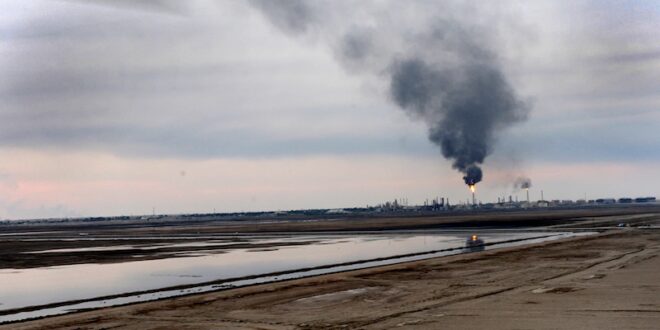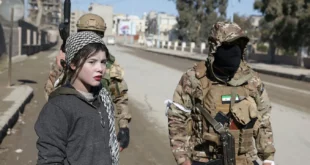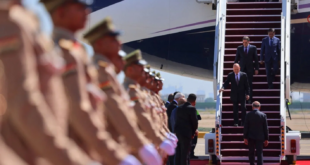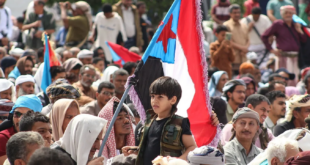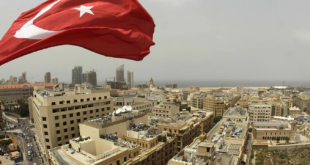This past July, Iraq and France’s TotalEnergies finalized the Gas Growth Integrated Project, a $27 billion energy deal aimed at Iraq’s natural resources and improving the country’s electricity supply. Despite Iraq’s natural wealth, decades of conflict and corruption have limited the country’s infrastructure, prompting over-reliance on Iran for energy provisions.
While previous Iraqi governments have struggled to attract foreign investments, Iraq’s complex political system has proven resistant to crises, and the nation’s current state of relative peace has catalyzed a shift. As regional reconciliation efforts persist, Iraq stands at the center, as the nation undergoes a pivotal phase of transition and complex reconstruction efforts. However, the path to energy sufficiency remains a considerable challenge for Iraq even with regional aid. Without domestic reforms to address the underlying causes of the energy crisis, Iraq’s journey towards achieving energy self-sufficiency is still a considerable distance away.
The TotalEnergies Deal
Initially signed in 2021, the deal with TotalEnergies had faced delays amid disputes over the terms, but was finalized in April when Iraq agreed to take a smaller-than-initially-demanded stake of 30 percent in the project. TotalEnergies took a 45 percent stake and QatarEnergy took the remaining 25 percent. The deal includes the development of infrastructure to recover flared gas from Basra oil fields to supply gas for power generation plants. It also involves the launch of a seawater treatment plant to provide water injection for pressure maintenance and increase oil production as an alternative to the use of fresh water. Additionally, the deal also includes the development of a 1GW Solar Power Plant with Saudi Arabia’s ACWA Power to supply electricity to the Basra region.
The agreement ultimately aims to address Iraq’s collective climate change objectives, end its dependence on unreliable energy sources, and strengthen essential services for the people. According to the press statement from the State Department, concluding this deal signifies a fast-improving business climate that will attract the foreign investments essential for creating economic opportunities benefitting all Iraqis. Iraq’s previous governments have struggled to draw in much-needed foreign investments for reconstruction efforts after decades of turmoil. However, this deal reflects new potential for reconstruction efforts in Iraq.
History
The electricity infrastructure in Iraq has suffered from inadequate maintenance since the 1980s. Power outages are part of daily life in Iraq, but older generations can vividly recall a bygone era under the previous regime when electricity was stable and consistent. Before the 1980s, Iraq boasted one of the most developed energy sectors in the region. Reflecting on the onset of the Iran-Iraq war, an Iraqi school teacher, Afkar Hawli, reminisces on her initial encounter with power outages:
In the 70s, the idea of power cuts was foreign to us. I remember the first time I heard of the power going out was in my first year of secondary school. Our teacher was very strict, and everyone came into class prepared except for one girl. She said the power went out when asked why she didn’t study. I remember thinking to myself ‘This girl is a genius for coming up with an excuse like that, it’s truly unheard of.’ Then it happened to the rest of us and eventually, it became all we knew.Following the eight-year-long war with Iran, the decline in oil revenue reduced the Iraqi government’s spending on public services. The 1990 Gulf War, coupled with the sanctions that followed, devastated state infrastructure, particularly the electric grid and water networks. By the end of the 1990s, most Iraqis did not have consistent access to electricity or water. “Under the sanctions, we didn’t have any power or generators. Only farmers had electricity so they could grow rice and wheat,” Afkar recalls.
Now, two decades after the 2003 US invasion, Iraq has failed to see improvements in the electricity infrastructure. Although the disparity between supply and demand is widening due to population increase and rising temperatures, corruption remains the largest obstacle to a reliable electricity grid. Iraq’s former prime minister, Mustafa al-Kadhimi, claimed that Iraq has spent more than $62 billion since 2003 on electricity generation. A parliamentary committee investigating the utility sector estimated that Iraq has invested $81 billion since 2005 without significant improvements to electrical output or the grid’s inefficiencies.
Iraq’s population is young, about 60 percent of the population is under the age of twenty-five, and this demographic has become increasingly disillusioned with the government—particularly in the aftermath of the Tishreen protests. The demonstrations were partly fueled by increased power outages in the summer. Other issues driving widespread grievances included corruption, unemployment, inefficient public services, and perceived foreign intervention. Over 600 protestors were killed, and investigations into the deaths failed to hold any perpetrators accountable. Today, the majority of Iraq’s population has grown up in a system that has promised to deliver on energy improvements, but changes in the standard of living have rarely materialized.
Natural Gas and Iran
Iraq’s proven gas reserves are the twelfth-largest in the world, but the country lacks the means to efficiently capture natural gas and leverage the resource into electricity. The country flares huge quantities of methane gas associated with oil and gas extraction. According to the World Bank, Iraq is one of seven countries that account for roughly two-thirds of global gas flaring. In 2022, Iraq was the second-largest source of gas flaring worldwide, second only to Russia. The TotalEnergies deal aims to help Iraq harness the natural gas emitted by its oil wells, achieve a more balanced energy portfolio, and address some of its domestic electricity shortages.
It would also be significantly cheaper for Iraq to harness its own gas rather than to continue with its current agreement with Iran. According to Iraqi Oil Minister Ihsan Ismael, Iraq pays Iran $8 per million British thermal units (BTU) for Iranian gas. By comparison, it is estimated that it would cost the government less than $2 BTU to produce Iraqi natural gas. Despite being OPEC’s second-largest producer, Iraq relies on Iran for nearly a third of its electricity, though this is often subject to interruptions. For instance, when Iran reduced gas supplies from 50 million cubic feet to 8.5 million cubic feet because of unpaid bills, widespread electricity shortages struck central and southern Iraq.
Iraq spends about $4 billion per year on imports of Iranian gas and power but has had trouble paying for those imports. The nation owes Iran around $12.1 billion in outstanding debts and struggles to pay due to US sanctions that only allow Iran to access funds for non-sanctioned goods, such as food and medicine. Going forward, Iraq is set to trade crude oil for Iranian gas to settle power debt, and end the issue of delays due to the need for US approval. According to Prime Minister Mohammad Shia al-Sudani, by trading Iraqi oil for Iranian gas, Iraq would avoid power cuts in the summer while working on the deals to complete gas capture and extraction projects that would help make the country self-sufficient.
Iraq in Transition: Regional Cooperation and Foreign Direct Investment
The involvement of Qatar and Saudi Arabia in the Gas Growth Integrated Project initiative is rooted in years of reconstruction and evolving relationships. Since 2003, Iraq’s prime ministers have attempted to foster stronger ties with the Gulf Cooperation Council (GCC) states—given geographical proximity, economic wealth, and shared sense of Arab identity. But Iraq only achieved a breakthrough in its relationship with the GCC states under Prime Minister Haider al-Abadi, when diplomatic relations with Saudi Arabia were re-established in 2015. In 2018, ties with Qatar notably improved during the Gulf crisis. In 2022, Iraq also finished paying reparations to Kuwait for its 1990 invasion. While Iraq has expressed a desire for cooperation with Gulf states in the past, its proximity to Iran and its instability hindered investment opportunities.
Iraq’s political system, which has been in place for two decades now, has shown its resilience in major crises such as terrorism, secessionist movements, and large-scale protests. The GCC states seem to have finally acknowledged that despite its many challenges, Iraq’s complex political system is not going anywhere anytime soon. In addition, strengthening ties with Iraq is an opportunity for the region as a whole. A strong, stable Iraq can serve as a conduit for increased regional cooperation since the nation’s central location has much to gain from peaceful relations between its neighboring countries. Iraq played a pivotal role in the peace negotiations between Saudi Arabia and Iran, with it poised to reap substantial benefits outside its position as a proxy.
Following the peace negotiations, Saudi’s engagement in the Shia-majority country is expected to increase. A noteworthy upcoming project entails an electricity interconnection between Saudi Arabia and Iraq, expected to be completed by 2024. In the initial phase, Saudi Arabia is set to export 1 gigawatt of electricity to Iraq through a 270-mile line. Another planned power initiative aims to connect Iraq to the GCC electrical grid. This endeavor envisions delivering 1.8 gigawatts of electricity by 2025, stretching from the al-Wafra station in Kuwait to Iraq’s Al-Faw station in the south. With a budget of $220 million, the GCC-Iraq line is supported by Kuwait and Qatar, and the GCC Interconnection Authority has already signed contracts with implementing companies. Both projects align with Iraq’s drive to diversify energy sources, to alleviate its heavy reliance on Iranian gas for power generation and to meet mounting public demand.
China
China plays a pivotal role in Iraq’s oil landscape, with over half of the nation’s oil production originating from fields operated by Chinese companies. China’s influential energy entities, including China National Petroleum Corporation (CNPC), have been entrenched in Iraq for years, marking a significant transformation of international oil companies within the nation. Chinese companies have deepened their operational involvement in Iraq, while Western International Oil Companies have consolidated or reduced their presence. CNPC accounts for approximately 30 percent of Iraq’s oil exports, strengthening its position as the country’s third-largest supplier and driving a nearly 50 percent surge in oil purchases from Iraq in 2022. However, despite China’s initiative to capitalize on the hesitancy of Western investments in Iraq, Iraq has prioritized diversifying its energy partners.
With Iraq’s new government prepared to move ahead with the largest budget in Iraq’s history, Chinese companies are well-positioned to participate in Iraq’s capacity expansion efforts well beyond trade in oil. China’s state-owned energy enterprises have established a strong foothold in Iraq’s upstream, midstream, and downstream markets. China’s Belt and Road Initiative (BRI) with Iraq has also continued to grow, as Iraq was the top target of China’s BRI in 2021. In addition to signs of China’s influence in Iraq, a grassroots Iraqi campaign called the Popular Movement for the Silk Road took to the streets in southern Iraq to advocate for close economic ties with China.
China’s position is poised to expand in Iraq, leveraging its popularity in the southern oil provinces and taking advantage of shared interests with pro-Iran political parties. The substantial presence of Chinese entities in Iraq prompted the administration of former Prime Minister Mustafa al-Kadhimi to impose restrictions on Chinese upstream investments. This included the oil ministry thwarting three prospective deals that would have handed Chinese firms more control over its oilfields. In 2021, plans by ExxonMobil and Russian Lukoil to sell stakes to Chinese firms were brought to a standstill by the Iraqi oil ministry. This move aimed to enhance diversity among energy sector partners. Iraqi oil officials were openly concerned that further consolidation of fields in the hands of Chinese companies would accelerate an exodus of Western oil companies.
The current government of Prime Minister Mohammad Shia al-Sudani has prioritized drawing foreign companies into Iraq’s energy sector, but they have not emphasized Chinese companies as exclusive partners for new business opportunities. Iraq’s political parties are divided on the issue of China’s influence in the country, requiring the current government to perform a balancing act to appease the different groups across its divided political spectrum.
France
As one of the top world oil and gas companies, TotalEnergies relationship with Iraq and the region is not new. In the 1970s, TotalEnergies had a service contract in Iraq that led to the discovery and development of the Maysan oil fields. Recently, Iraq has become more critical for the gas company as TotalEnergies projects in Iran (negotiated in the late 1990s) and Syria (negotiated in 2008) are on hold because of sanctions. In 2009 and 2012, TotalEnergies wanted to return to Iraq but the service contracts were limited, so it joined a China National Petroleum Corporation consortium to exploit the al-Halfaya field.
As a Western company, it is favorable for China as they have cooperated on Iraqi land previously. In terms of regional partnerships, it has strong economic and political ties with most of Iraq’s neighboring countries, except for Turkey, positioning itself as a trusted partner in various regional endeavors. France’s opposition to the US withdrawal from the Iran nuclear agreement has garnered tacit approval from influential Iranian figures in the country. Iran’s acceptance of France also plays a pivotal role in countering China’s growing geostrategic influence in the region. France’s relationship with the United States further enables it to act as a potential mediator between Iran and the West, as Iran seeks the lifting of crippling sanctions that have impacted its economy. In navigating the delicate regional dynamics, France’s diplomatic ties and ability to gain acceptance from both Western and Iranian stakeholders position it as a key player in shaping Iraq’s future and regional stability.
Iraq’s Energy Crisis
While diversifying the country’s energy sources is important, it won’t be effective without addressing the rehabilitation of the power infrastructure, and that requires addressing the current structure of Iraq’s political system. Former Iraqi Minister of Electricity Luay al-Khateeb tweeted in response to US tech companies investing in Iraq’s power grid, that advanced technical solutions aren’t enough to solve the sector’s issues. He believes Iraq’s power problems stem from financial and organizational factors, and that the solutions necessitate political support for any government willing to “champion the reform mission in order to put an end to Iraq’s endemic corruption and mismanagement of the power sector.” Khateeb points out that Iraq loses $20 billion annually due to subsidies, fuel costs, power piracy, and the political quota system. Additionally, there’s a $20 billion annual loss in GDP contributions due to power shortages affecting industries and commerce. He warns that without aggressive reform, Iraq’s national grid will fail by 2030, compromising the nation’s security.
Diversification efforts won’t yield significant benefits for the overall electricity sector or stabilize the ministry’s financial situation unless accompanied by infrastructure upgrades and appropriate regulatory measures. For example, the deal with TotalEnergies involves establishing a 1 gigawatt solar power plant, but the existing grid’s limitations could pose challenges. The grid’s vulnerabilities are evident when Iran reduces gas supplies, causing voltage issues and frequency deviations. Moreover, TotalEnergies efforts focused on gas-capture and power-generation projects need the grid to be able to accommodate the new supply which requires substantial infrastructure improvements. The deal to connect Iraq to the GCC grid is promising, but political interference in energy projects threatens to impede progress and prolong these challenges. For Iraq to further its developments, it needs to build internally for the outside investments to fully manifest.
Conclusion
The newly formed Iraqi government has inherited a framework established by past prime ministers, which is now effectively attracting foreign investments from both regional and international sources. The recent collaborative agreement involving the Gulf states and France represents a significant departure from Iraq’s historical dependence on Iran for energy and the growing influence of China in its oil fields. As Iraq enters a transitional phase marked by extensive reconstruction endeavors, this delicate balancing act of non-alignment becomes crucial for its progress, enabling the nation to maintain its role as a mediator in the region.
Iraq stands to gain from fostering cooperation among its neighbors without being utilized as a proxy, given its strategic geographical position. This approach is the most viable solution capable of appeasing the secular factions across Iraq’s political spectrum. However, despite the notable strides in foreign relations, Iraq’s energy crisis is not rooted in any shortage of natural wealth, but in Iraq’s failure to utilize that wealth due to corruption. In order for Iraq to truly advance, it must implement robust systems that hold government officials accountable.
 Eurasia Press & News
Eurasia Press & News
